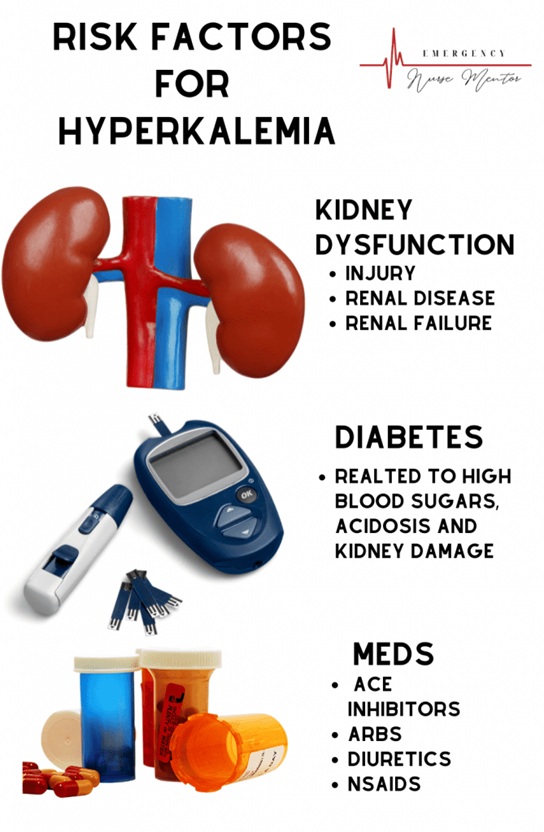A nurse is reviewing the laboratory test results from a client who has prerenal acute kidney injury (AKI). Which of the following electrolyte imbalances should the nurse expect?
Hypernatremia
Hypophosphatemia
Hypercalcemia
Hyperkalemia
The Correct Answer is D
Choice A reason: Hypernatremia, which is an abnormally high level of sodium in the blood, is not typically associated with prerenal AKI. Prerenal AKI is often related to hypovolemia, which can lead to hyponatremia rather than hypernatremia.
Choice B reason: Hypophosphatemia, or low levels of phosphate in the blood, is not a common finding in prerenal AKI. Phosphate levels are more often affected in intrinsic renal diseases or refeeding syndrome.
Choice C reason: Hypercalcemia, or high levels of calcium in the blood, is not commonly seen in prerenal AKI. It is more frequently associated with malignancies or hyperparathyroidism.
Choice D reason: Hyperkalemia, which is an elevated level of potassium in the blood, is a common electrolyte imbalance in prerenal AKI. This occurs due to decreased renal perfusion and the kidney's reduced ability to excrete potassium.

Nursing Test Bank
Naxlex Comprehensive Predictor Exams
Related Questions
Correct Answer is B
Explanation
Choice A reason: Hyperkalemia refers to high potassium levels, which may not directly cause shortness of breath and swelling.
Choice B reason: Hypervolemia, or fluid overload, is likely the cause of the client's symptoms, including shortness of breath, swelling, crackles in the lungs, and elevated blood pressure.
Choice C reason: Hypovolemia, or fluid deficit, would not typically present with swelling and crackles in the lungs.
Choice D reason: Hyponatremia refers to low sodium levels, which may not directly cause the symptoms described.
Correct Answer is A
Explanation
Choice A reason: Acute tubular necrosis (ATN) is a condition where there is damage to the renal tubular cells, which can lead to a decrease in GFR. This is because the tubular cells are responsible for reabsorbing substances from the filtrate back into the blood. When these cells are injured, they cannot function properly, leading to a buildup of waste products and a decrease in GFR.
Choice B reason: While obstruction can lead to a decrease in GFR, it is not the primary cause in the context of acute tubular necrosis. Obstruction typically occurs in postrenal causes of acute kidney injury.
Choice C reason: In?ammatory cells do invade damaged kidneys, but this is more characteristic of conditions such as acute interstitial nephritis rather than ATN. In ATN, the primary issue is the injury to the tubular cells themselves.
Choice D reason: A reduction of blood flow to the kidneys, or prerenal azotemia, can indeed lead to a decrease in GFR. However, in the context of ATN, the primary issue is not the blood flow but the damage to the renal tubules.
Whether you are a student looking to ace your exams or a practicing nurse seeking to enhance your expertise , our nursing education contents will empower you with the confidence and competence to make a difference in the lives of patients and become a respected leader in the healthcare field.
Visit Naxlex, invest in your future and unlock endless possibilities with our unparalleled nursing education contents today
Report Wrong Answer on the Current Question
Do you disagree with the answer? If yes, what is your expected answer? Explain.
Kindly be descriptive with the issue you are facing.
